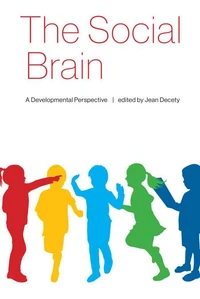An overview of the latest interdisciplinary research on human morality, capturing moral sensibility as a sophisticated integration of cognitive, emotional, and motivational mechanisms. Over the past decade, an explosion of empirical research in a variety of fields has allowed us to understand human moral sensibility as a sophisticated integration of cognitive, emotional, and motivational mechanisms shaped through evolution, development, and culture.
Evolutionary biologists have shown that moral cognition evolved to aid cooperation; developmental psychologists have demonstrated that the elements that underpin morality are in place much earlier than we thought; and social neuroscientists have begun to map brain circuits implicated in moral decision making. This volume offers an overview of current research on the moral brain, examining the topic from disciplinary perspectives that range from anthropology and neurophilosophy to justice and law.
The contributors address the evolution of morality, considering precursors of human morality in other species as well as uniquely human adaptations. They examine motivations for morality, exploring the roles of passion, extreme sacrifice, and cooperation. They go on to consider the development of morality, from infancy to adolescence; findings on neurobiological mechanisms of moral cognition; psychopathic immorality; and the implications for justice and law of a more biological understanding of morality.
These new findings may challenge our intuitions about society and justice, but they may also lead to more a humane and flexible legal system. ContributorsScott Atran, Abigail A. Baird, Nicolas Baumard, Sarah Brosnan, Jason M. Cowell, Molly J. Crockett, Ricardo de Oliveira-Souza, Andrew W. Delton, Mark R. Dadds, Jean Decety, Jeremy Ginges, Andrea L. Glenn, Joshua D. Greene, J. Kiley Hamlin, David J.
Hawes, Jillian Jordan, Max M. Krasnow, Ayelet Lahat, Jorge Moll, Caroline Moul, Thomas Nadelhoffer, Alexander Peysakhovich, Laurent Prétôt, Jesse Prinz, David G. Rand, Rheanna J. Remmel, Emma Roellke, Regina A. Rini, Joshua Rottman, Mark Sheskin, Thalia Wheatley, Liane Young, Roland Zahn
An overview of the latest interdisciplinary research on human morality, capturing moral sensibility as a sophisticated integration of cognitive, emotional, and motivational mechanisms. Over the past decade, an explosion of empirical research in a variety of fields has allowed us to understand human moral sensibility as a sophisticated integration of cognitive, emotional, and motivational mechanisms shaped through evolution, development, and culture.
Evolutionary biologists have shown that moral cognition evolved to aid cooperation; developmental psychologists have demonstrated that the elements that underpin morality are in place much earlier than we thought; and social neuroscientists have begun to map brain circuits implicated in moral decision making. This volume offers an overview of current research on the moral brain, examining the topic from disciplinary perspectives that range from anthropology and neurophilosophy to justice and law.
The contributors address the evolution of morality, considering precursors of human morality in other species as well as uniquely human adaptations. They examine motivations for morality, exploring the roles of passion, extreme sacrifice, and cooperation. They go on to consider the development of morality, from infancy to adolescence; findings on neurobiological mechanisms of moral cognition; psychopathic immorality; and the implications for justice and law of a more biological understanding of morality.
These new findings may challenge our intuitions about society and justice, but they may also lead to more a humane and flexible legal system. ContributorsScott Atran, Abigail A. Baird, Nicolas Baumard, Sarah Brosnan, Jason M. Cowell, Molly J. Crockett, Ricardo de Oliveira-Souza, Andrew W. Delton, Mark R. Dadds, Jean Decety, Jeremy Ginges, Andrea L. Glenn, Joshua D. Greene, J. Kiley Hamlin, David J.
Hawes, Jillian Jordan, Max M. Krasnow, Ayelet Lahat, Jorge Moll, Caroline Moul, Thomas Nadelhoffer, Alexander Peysakhovich, Laurent Prétôt, Jesse Prinz, David G. Rand, Rheanna J. Remmel, Emma Roellke, Regina A. Rini, Joshua Rottman, Mark Sheskin, Thalia Wheatley, Liane Young, Roland Zahn

 , qui est-ce ?
, qui est-ce ?